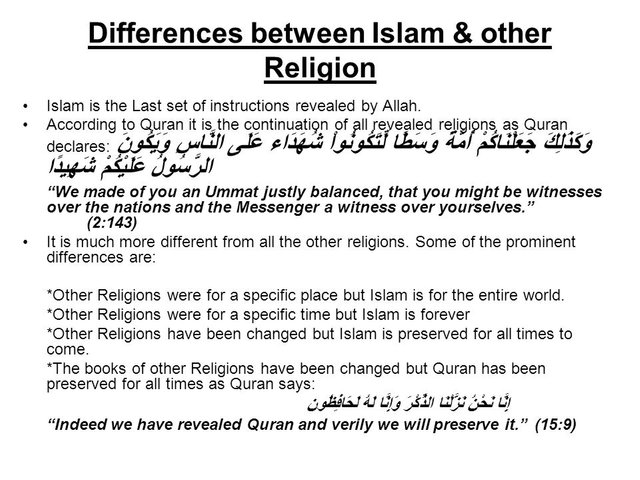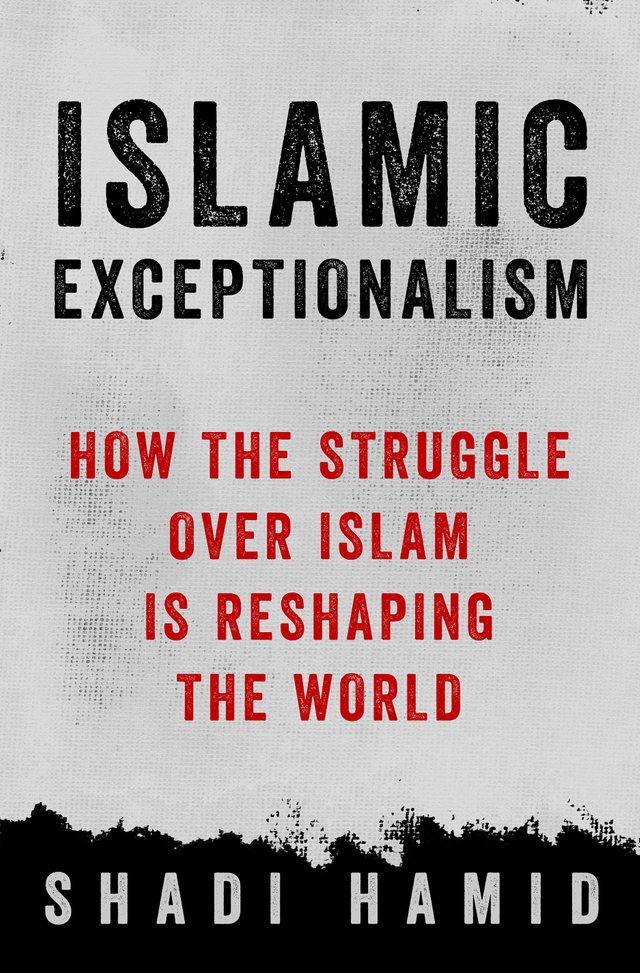The difference between Islam and other religions!!
Our scholars have decided that a Muslim must know the fundamentals of his religion and what a Muslim can not excuse in ignorance of Islam.

The definition of division is one of the methods of knowledge that helps to achieve science and uncover the unknown. Thus, the direct teachings of Islam are shown to him on the one hand, and on the other hand distinguish him from the other corresponding divisions.
This article deals with the division of Islam, in order to determine the difference between Islam and other religions in terms of the definition of "the definition of things," and the article also means a difference between the Muslims themselves from the same perspective.
In his book, Abderrahmane Hibanki mentions in his book Knowledge Controls and Principles of Inference, which the regions decided that the identifiers or the open statement are either done by the borders or the drawings, which are either complete or incomplete, and add to the sections of the fees the verbal definition, the definition of the example and the definition of division, Which divides into it, the parts of the thing, especially from the characteristics shown to him.
Some scholars call the division "the separate policeman" and the scholars and speakers call it soundness and division, as al-Ghazali stated in the standard of science in the art of logic. Ibn Taymiyyah conveyed the concept in his book: A separate policeman who is called by fundamentalists sounding and division has been called and also the division and division.
Ibn Hazm spoke about it in his book "The Circumcision of the Split" and that it is useful to define the difference between the two and the other in the ruling. He says: "It is to divide the thing that you want to know the validity of his rule in all its parts, These sections shall not be heterogeneous or different, each one of which is contrary to the other, and the two sections may be onward. "
One of the benefits of defining the division is what Al-Farabi sees in his book "The words used in logic" that the division is useful in facilitating the preservation and that: "The interviewers put each other in the shoes of some, so it is easy to understand each one of the interviewers and save." And the division of the tools of induction and inventory and inference and maintenance of the fallacy in governance.
In his book Logic, Ibn Sina mentions that the extrapolation in which all particles are met is the conditional analogy "because that extrapolation is actually a measure, which is the conditional measurement that is called the divisor." He says, "Divide, although it does not measure the limit, is useful in the limit."
The points of difference between Islam and the world's major religions can be summarized as follows:
He believes in the existence of a god: religions believe either in the existence of a god or the absence of a god, and Islam is one of the religions that believes in the existence of a god, unlike atheism, which denies the presence of God or his role in life. And we are not in the Moathin, "there is no creator or masterminded by them. Islam thus distinguishes Islam from the division from atheism, given the element of faith.
Islam is a religion that has an integrated concept of God: religions are classified into a religion that speaks of God and religions preferred to remain silent about the questions of the unseen or the views of nature and focused on ethics and worship, and worship in the sense of rituals that justify human morality, they are the religions of non-divine. It differs from the former in not denying the Creator, nor did it prove it. Islam contradicts Buddhism, Jainism, where Buddha (Sodarta Gautama) did not speak, nor did he speak of God despite the question of their followers about the Creator.
Islam is a non-denominational religion: Most Indian and Chinese religions are based on the teachings of its founders, and do not claim to follow the direct revelation. Hinduism is not established. It is a traditional inherited religion. Buddhism belongs to Sodara Gautama, Genghira to Mahavira, Sihiya to Guru Nanak, Confucianism to Confucius, To Lao Zi. Islam is a religion based on revelation, "I follow only what I suggest."

Islam is a non-Circumcision religion: All previous religions are based on worship more than a god, but Islam is not in it.
Islam is a pure unity: the common characteristics of the divine religions are the belief in unification beginning, revelation, prophecy, and the other, and the angels (the religions do not believe in angels but believe in the lives of good and evil). Despite the participation of Zoroastrianism, Judaism and Christianity in the classification under the heavenly religions and monotheistic religions, the pure monotheistic view of Islam is the separation between them and these religions. There is no trinity or divinity of a prophet, and no other races are asked to seek their own God. Evil like Zoroastrianism.
Classes: Some religions explicitly call for a class system that is religious. Hinduism divides people into five degrees of supervision and others (Brahman, Kashratas, Vishash, Chidras, Dalits). All religions of India believe in karma (the human condition of wealth and poverty depends on his work in his previous life) The class system is therefore included. In addition, Judaism is based on ethnicity: the religion of the children of Israel, "God's chosen people", while Islam is characterized by the absolute equality between the sons of Adam.
Prophecy of Muhammad and universality of the call: One of the most important features of the violation of Islam to other religions is the prophecy of the ring of the prophets, while rejecting religions this important element and fundamental in Islam.